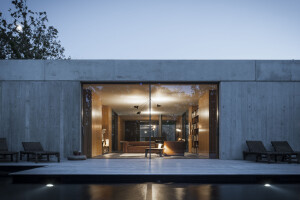In this interior design project in Curitiba (Paraná), a 1970s apartment was updated through both layout modifications and material choices. But it truly comes to life through the active involvement of the clients, who brought in references (and furniture) from previous Arquea projects, as well as antique pieces, design items, prints (by Niemeyer, Burle Marx...), and objects acquired during their travels. This is a project grounded in the clients’ trust in our work—clients who researched and appreciated our approach—making the process an organic blend of ideas and references.


The layout changes were guided by the profile of the residents: a young, child-free couple who love to entertain but also value moments of tranquility. To support this lifestyle, we expanded the social area to facilitate cooking and hosting, integrating the living, dining, kitchen, and laundry/balcony spaces. We emphasized natural lighting (even with the enclosed balcony, thanks to a fluted glass door) and introduced unique elements, such as custom tiles we designed specifically for this project.




At the same time, we created a private yet connected intimate area by building a closed circulation space between the bedrooms, defined by a wood panel made from natural feijó veneer. The goal here was to provide privacy and honor each partner’s need for quiet when necessary.


Among the references the clients brought from Arquea’s previous work are a metal bookcase designed by us, a wooden armchair also created by our studio, and a dining table with a green Guatemala marble top—an element echoed in the master bedroom.


From the interplay between the clients’ needs and the renovation constraints of this 1970s apartment, new solutions emerged: the wooden panel that defines the private circulation area continues into the kitchen cabinetry, becoming an aesthetic feature of the design. Expanding the living area allowed for a seamless connection from one end of the apartment to the other, flooding the space with natural light, creating a view across the entire space, and enhancing the overall sense of openness.














































